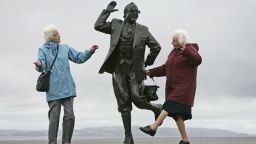Want to increase your daily steps? Get competitive.
A new study followed 602 overweight or obese adults using fitness trackers and found those who entered a competition game to boost their daily steps had the highest increase in physical activity when compared to groups with no, or different, rewards.
“We compared whether competition, collaboration or support worked the best. People exposed to competition added 920 steps a day to their activity levels compared to the control group, while the collaboration and support groups only added 600 steps,” said Dr. Mitesh Patel, who directs the Penn Medicine Nudge Unit, the world’s first behavioral design team embedded within a health system.
The team’s goal is to use behavioral economics to design ways to improve individual health behaviors like physical activity, health loss and the like.
Not only did the group who competed against others do more steps, they continued to do so for three months after the game ended (as part of the research followup), doing more than 600 steps a day over the additional three months.
“Over the course of nine months, the people in the competition group walked about a hundred miles more than the people in the control group,” Patel said.
In fact, the controls and groups who used collaboration, like an exercise buddy, or support from family or friends saw their activity levels drop back after the game ended.
“This is the largest gamification trial ever done to my knowledge,” Patel said. “It studied people from 40 different US states over nine months. I think it has the potential to have a huge impact.”
The study was published Monday in the journal JAMA Internal Medicine.
Gaming our behavior
Gamification, or using rewards, points and other tricks to boost our engagement with healthy behaviors, is an increasingly popular tool among workplace wellness and insurance programs.
“It’s usually based on what’s called standard economics, meaning you do something, get rewarded, and as you do more you move up a level to even greater rewards,” Patel explained.
Behavioral science already knows a good deal about how to motivate us. It turns out, for example, that we are much more likely to care about losing rewards we already have than gaining new ones.
“We gave people 70 points at the beginning of every week and they lost points if they didn’t meet their goal,” said Patel. “So, every day they’d get a text message. You didn’t meet your goal, you lost 10 points. And that tends to be more motivating.”
At the end of every week people moved up or down status levels. Lowest was blue, then bronze, silver, gold and platinum. Each person began the program at the silver level, so if they fell down one level, they might feel the bite of losing status – another motivational trick learned from behavioral science.
In addition, the study made participants sign a contract that they would stay in the program.
“We know that people who signed pre-commitment contracts are more likely to stick to their goals,” Patel said.
Most exercise trackers set a goal of 10,000 steps a day, Patel said. But this study allowed participants to choose their own goals, as long as the goal was at least 1,500 steps above baseline. Setting smaller, more attainable goals, Patel said, is more likely to boost success.
“The other key thing we used is something called the ‘fresh start effect,’” Patel said. “People are more motivated for aspirational behavior around the temporal landmarks, like the beginning of the year, at the beginning of the month, or the week.
“And so every week we gave 70 new points, which meant you had a fresh start,” Patel said. “So, all of those things added up. But in the end what made the difference was using competition.”
Does this all sound like behavioral manipulation? Perhaps, Patel said.
“Yeah, but it’s for your own good,” he said. “Certain industries may try to use these techniques to get you to purchase things or gamble. Here we’re trying to assist people to be healthier.”




